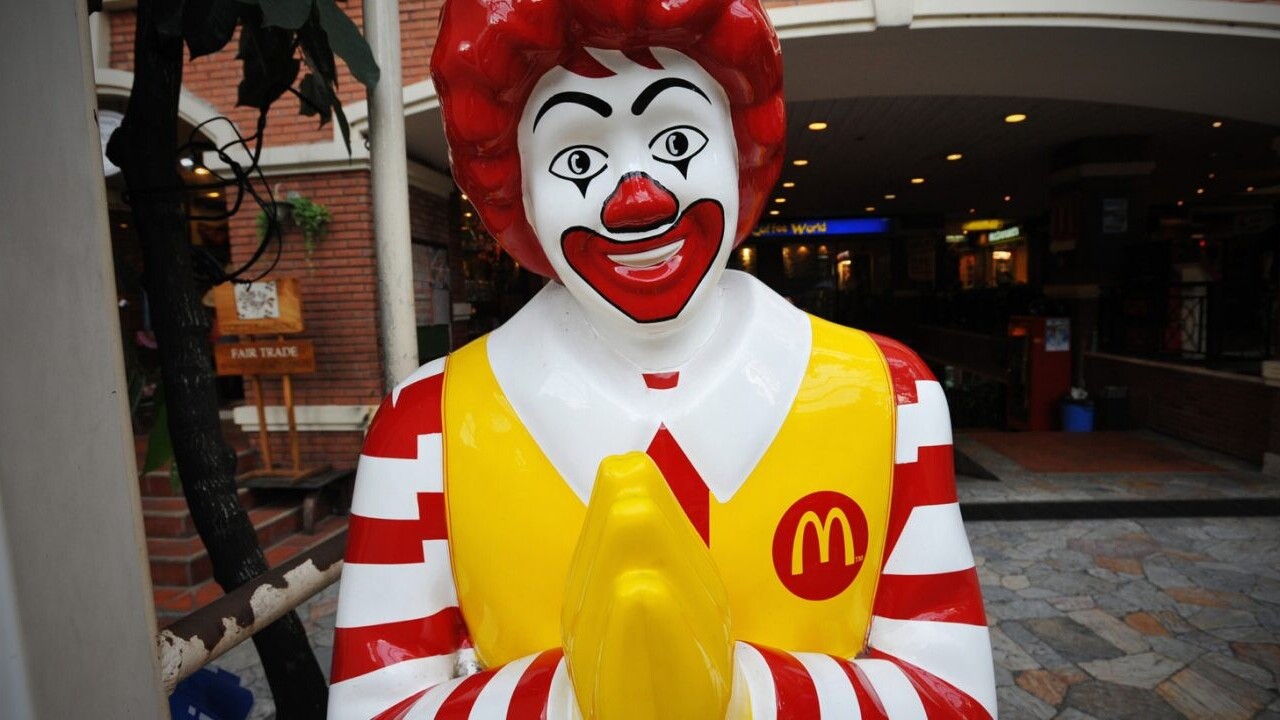
Ba da ba ba bah, McDonald’s is capturing and storing biometric data on its customers without their knowledge or consent.
Per a report from The Register, McDonald’s may be facing a class action lawsuit after an Illinois customer sued the mega-corporation for allegedly violating the state’s Biometric Information Privacy Act (BIPA):
(The plaintiff) sued McDonald’s … on behalf of himself and all other affected residents of Illinois. He claimed the fast-chow biz has broken BIPA by not obtaining written consent from its customers to collect and process their voice data.
Illinois has some of the stiffest biometric privacy laws in the US.
The lawsuit apparently stems from the company’s use of automated drive-thru order takers in the form of chatbots.
Drive-thru customers were subjected to experimental natural language processing (NLP) AI in the state, in at least 10 of the company’s locations. While it’s unclear exactly what AI systems McDonald’s was using during the trial, it stands to reason the company would need to collect and store user data in order to train its AI.
The big picture
It’s hard to spot precedence in the wild, but there’s no denying the world sits on the rocky precipice of embracing autonomy. This very well could be the legal catalyst that kicks off the big business V big government debate over how we’re going to go about transitioning to the next technology paradigm for capitalism.
From a purely business-oriented POV, McDonald’s might not be in as bad a position as it appears. What’s an eight-figure lawsuit to company worth nearly $200 billion?
McDonald’s has been dabbling in AI systems for years now, and there’s an argument to be made that it’s poised to lead the charge when it comes to autonomous systems.
The perfect storm
Autonomous robotics technology is nothing new. Today it powers automotive factories and the garment manufacturing industry.
And that makes it easy for us to imagine other industries, such as fast food, adopting a similar approach. We’ve certainly heard a lot about burger-flipping robots and the end of entry-level jobs for the past decade.
The majority of discourse on automation focuses on the one-for-one human costs of replacement. We often envision the debate being about whether the efficiency and corporate labor cost reductions are worth the potential mass displacement of human workers.
But what if we stop thinking about McDonald’s like a greasy spoon and start thinking of it like Facebook, Google, or Microsoft.
The mainstream my recognize those as a social network, search giant, and OS developer respectively, but the truth of the matter is each one is an AI-first company. And with each passing year, AI endeavors make up a greater portion of their profits and net worth.
[Read: Global AI market predicted to reach nearly $1 trillion by 2028]
If McDonald’s were to convert its global market position as a restaurateur into a horizontal entry into the technology sector… interesting things could happen.
McDonald’s, but as an AI company
Strip away the what and how of where McDonald’s exists as a global corporation and you can compare it to other big tech businesses. The most apt comparison might be Facebook.
McDonald’s serves approximately one percent of the global population on a daily basis. Facebook, by contrast, reaches approximately 25% of the population. The biggest difference between the two, arguably, is that consumers typically have to pay to use the former’s services while Facebook monetizes its customers.
Let’s imagine a new McDonald’s where the food no longer costs money. Like Facebook, all you’d have to do is sign up and create a profile. Then, you could either go to a McDonald’s location to pick up food or request a delivery.
Every few orders, however, you may be asked to do something simple such as filling out a series of questionnaires similar to those “I’m not a robot” CAPTCHA’s where you click on the traffic lights or bicycles.
You might be tasked with ordering via voice or handwriting, so the system can capture your biometric data.
Most of the time, however, you’d just get free food for signing up and agreeing to McDonald’s terms and conditions.
Behold: Hypercapitalism
If this sounds a bit like socialism or communism, just remember: there’s no such thing as a free lunch. Whatever data McDonald’s could gather would be worth a fortune. It’s already a globally recognized brand with more than 38,000 locations in 100 countries.
The reason why so many big tech companies have pivoted to AI is because it’s a trillionaire’s market. Anyone can gather data, but only a few organizations have the money and infrastructure to gather data from billions of people at a time – and even fewer can ensure they’ll keep coming back for more no matter what.
There’s nothing stopping McDonald’s from using its burgers and nuggets to achieve the same goals as Facebook does with Candy Crush and conservative conspiracy theories.
The picture starts to come into focus when you consider that Facebook was founded in 2004 and it’s worth $280 billion while the first McDonald’s opened in 1955 and its only worth $170 billion.
Could McDonald’s turn feeding the hungry into the next big global data-gathering endeavor? What would you do for a “free” cheeseburger?
Get the TNW newsletter
Get the most important tech news in your inbox each week.





